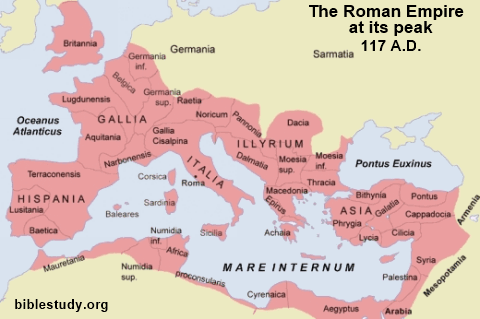
Roman Empire noun
- the lands and peoples subject to the authority of ancient Rome.
- the form of government established in ancient Rome in 27 b.c., comprising the Principate or Early Empire (27 b.c.–a.d. 284) and the Autocracy or Later Empire (a.d. 284–476).
- a later empire, as that of Charlemagne or the Byzantine Empire, regarded as a restoration or continuation of the ancient Roman Empire or one of its branches.
Compare Holy Roman Empire. British Dictionary definitions for roman empire Roman Empire noun
- the territories ruled by ancient Rome. At its height under Trajan, the Roman Empire included W and S Europe, Africa north of the Sahara, and SW Asia. In 395 ad it was divided by Theodosius into the Eastern Roman Empire whose capital was Byzantium and which lasted until 1453, and the Western Roman Empire which lasted until the sack of Rome in 476
- the government of Rome and its dominions by the emperors from 27 bc
- the Byzantine Empire
- the Holy Roman Empire
roman empire in Culture Roman Empire
The empire centered at the city of Rome, in what is now Italy; the most extensive Western civilization of ancient times. According to legend, the empire was founded in 753 b.c. by two brothers, Romulus and Remus. Rome was at first ruled by kings. Then, about 500 b.c., the Roman Republic was established, with two annually elected consuls at its head, guided by a senate. The republic eventually weakened, and Rome passed to rule by one man — first Julius Caesar, who was assassinated in 44 b.c. His successor was Augustus, who assumed the title of emperor. Over the next few centuries, he was followed by a succession of emperors. The whole Western world eventually became subject to Rome and was at peace for roughly the first four centuries after the birth of Jesus (see Pax Romana). The empire was known for its strongly centralized government and for massive public works, such as roads and aqueducts, which helped maintain its power and efficiency. As the years passed, the Roman Empire was divided into eastern and western portions (see Byzantine Empire and Constantine the Great), developed internal weaknesses, was invaded by outside tribes, and eventually ceased to exist (see Fall of Rome).
Note The Holy Roman Empire represented an effort in the Middle Ages to develop a government with some of the characteristics of the old Roman Empire.Note In the early twentieth century, to raise the spirits of the Italians, the dictator Benito Mussolini revived some of the customs and expressions of the ancient empire.
 Liberal Dictionary English Dictionary
Liberal Dictionary English Dictionary